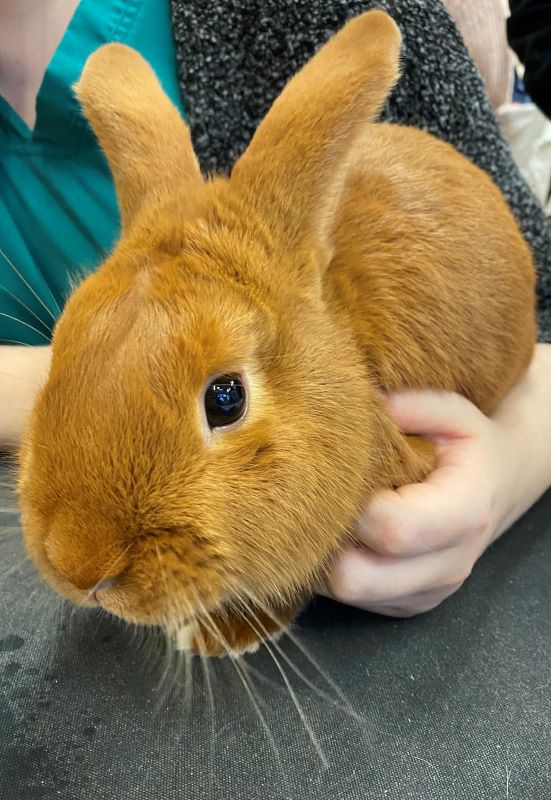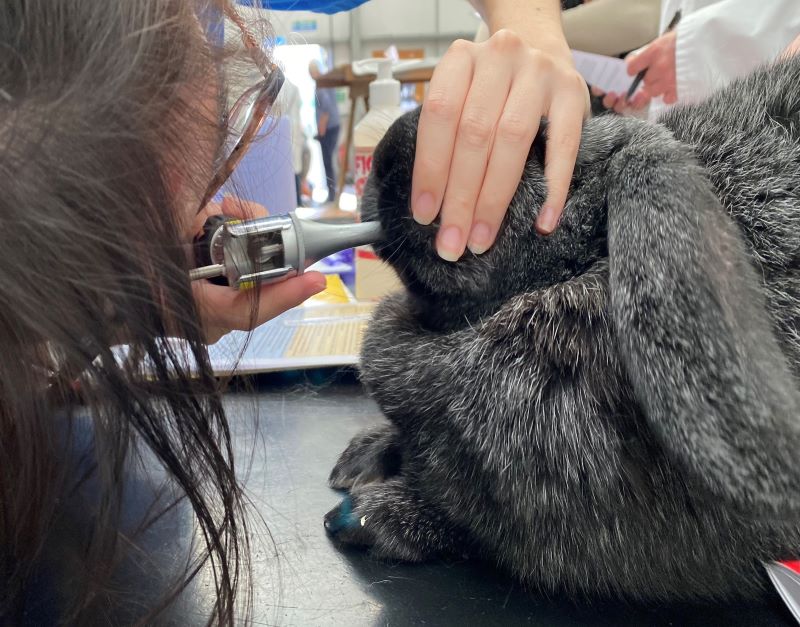New research from the RVC finds no strong link between rabbit ear type or head shape and dental problems
A new study from the Royal Veterinary College (RVC) has found there’s no substantial link between popular conformation in rabbits, including floppy ears or flat faces, and an increased risk of dental problems. The study concluded that instead, diet, environment and regular dental checks might be more important in the development of dental disease, helping veterinarians and rabbit owners prioritise care and support rabbit welfare.

Dental disease is one of the most common and painful conditions affecting pet rabbits in the UK, with recent studies estimating it affects up to 18% of the population, but it can often go unnoticed until it becomes more severe. Breeds with lop ears and short skulls (brachycephaly) have long been suspected of being more at risk of dental disease. However, there has been limited research to date to support this. Therefore, a team of RVC researchers, led by Maria Jackson, Research Assistant in Rabbit Health and Welfare and Veterinary Nurse, and Dr Charlotte Burn, Associate Professor in Animal Welfare and Behaviour Science, set out to explore whether these physical features in rabbits are linked to dental problems.
The study involved visual dental checks of 435 volunteered pedigree rabbits from 49 breeds at British Rabbit Council shows and breeders’ studs across the UK. The researchers assessed tooth and mouth health using an otoscope, while also recording ear type, head shape (on a purpose-made visual scale), body size, age and sex.
The findings revealed that:
- Many rabbits had no obvious dental issues with 68.28% of rabbits having no incisor abnormalities and 55.40% having no issues with their cheek teeth.
- Lop-eared rabbits were not more likely to have dental problems but were 4.03 times more likely to have watery eyes – a symptom that could be linked to other health issues.
- Flat-faced (brachycephalic) rabbits did not show more dental abnormalities than those with longer faces.
- Longer-faced rabbits (dolichocephalic) were slightly more likely (1.39 times) to have a specific dental issue known as “step or wave mouth”, where the premolars and molars have a step-like pattern and don’t align normally.
- Older age and sex were more consistently linked to dental abnormalities. Male rabbits were 2.06 times more likely to have an incisor abnormality and 2.23 times more likely to have slanted or curved incisor occlusal surfaces. While females were 2.18 times more likely to have long first cheek teeth, although the clinical significance of some of these findings isn’t clear.
The study highlighted the important role of vets, owners and breeders in the preventive care of rabbits’ dental health. This includes undertaking routine dental checks, providing a nutritional diet (with ad lib hay or grass) and ensuring an enriched environment. Researchers also concluded that any breeding decisions should be based on veterinary assessment of dental health, including otoscope or radiography examinations rather than relying solely on visual inspection of the teeth or a rabbit’s conformation.
Maria Jackson, Research Assistant in Rabbit Health and Welfare, Veterinary Nurse, and Lead Author on the paper said:
“Our findings add to the evidence that suggests lop ears and a brachycephalic head shape are less important in the development of dental issues in rabbits than was once thought. It’s clear that all rabbits, not just those with a non-wild conformation, can be affected by dental problems.
“The importance of feeding good-quality hay or grass and supplementing the diet with extruded pellets, not muesli, cannot be overstated, as diet may well be more important than conformation in the development of dental disease. Likewise, providing regular veterinary dental check-ups to rabbits is crucial to facilitate early dental disease detection and give case-specific dietary and treatment recommendations to slow disease progression and support the welfare of rabbits.”
Dr Charlotte Burn, Associate Professor in Animal Welfare and Behaviour Science at the RVC and co-author of the paper, said:
“This research suggests that while rabbit conformation should not be entirely disregarded, it may not be as critical a factor for dental disease as previously thought. Encouragingly, this empowers rabbit owners and breeders to take proactive steps in promoting dental health through appropriate nutrition and husbandry, regardless of a rabbit’s breed or appearance.”
This research was funded by the Animal Welfare Foundation and the RVC’s Animal Care Trust.

Julian Kupfer, Animal Welfare Foundation’s Chair of Trustees, said:
“This study shows the beauty of evidence-based research, arming the veterinary profession and owners with knowledge and clarity that can make a real impact on the welfare of rabbits under our care.”
Professor Christianne Glossop, Chair of the Animal Care Trust, said:
“Funded by the Animal Care Trust, this study helps dispel concerns that certain breeds of rabbits are more likely to suffer from dental disease, and highlights the importance of diet, the environment and regular dental checks to help our rabbits thrive. Dr Charlotte Burn and all the team should be congratulated for their painstaking work, making a difference to the wellbeing of one of the UK’s most popular pets.”
Notes to Editors
Jackson, M. A., Betts, M., Hedley, J., & Burn, C. C. (2025). Rabbit Dental Abnormalities: Investigation of Conformational Risk Factors in a Pedigree Rabbit Population. Animals, 15(7), 980. DOI: https://doi.org/10.3390/ani15070980.
This study was funded [in part] by the Animal Welfare Foundation (AWF). AWF is the British Veterinary Association’s charity, and a fundraising and grant-giving charity (charity number 1192203), advancing knowledge on animal welfare through research, education and debate. More information can be found at www.animalwelfarefoundation.org.uk
For more information please contact:
- Jasmin De Vivo devivo@plmr.co.uk or rvc@plmr.co.uk
- Press Line: 0800 368 9520
About the RVC
- The Royal Veterinary College (RVC) is the UK's largest and longest established independent veterinary school and is a Member Institution of the University of London.
- It is one of the few veterinary schools in the world that hold accreditations from the RCVS in the UK (with associated recognition from the AVBC for Australasia, the VCI for Ireland and the SAVC for South Africa), the EAEVE in the EU, and the AVMA in the USA and Canada.
- The RVC is ranked as the top veterinary school in the world in the QS World University Rankings by subject, 2025.
- The RVC offers undergraduate and postgraduate programmes in veterinary medicine, veterinary nursing and biological sciences.
- The RVC is a research-led institution, with 88% of its research rated as internationally excellent or world class in the Research Excellence Framework 2021.
- The RVC provides animal owners and the veterinary profession with access to expert veterinary care and advice through its teaching hospitals and first opinion practices in London and Hertfordshire.
- http://www.rvc.ac.uk
About The Animal Care Trust
- The Animal Care Trust supports the RVC hospitals that treat and care for over 30,000 animal patients a year by providing funds for new equipment and enhanced facilities.
- The Animal Care Trust supports clinicians and scientists of the future, invests in the development and application of scientific research, funds pioneering work in animal and human health, and assists research projects carried out by RVC researchers and undergraduate and postgraduate students.
- https://www.rvc.ac.uk/act
About Animal Welfare Foundation
- This study was funded [in part] by the Animal Welfare Foundation (AWF), the British Veterinary Association’s welfare charity.
- It is a fundraising and grant giving charity (charity number 1192203), whose aims are advancing knowledge on animal welfare through research, education and debate.
- www.animalwelfarefoundation.org.uk
